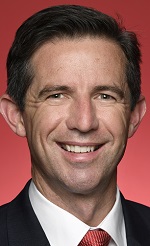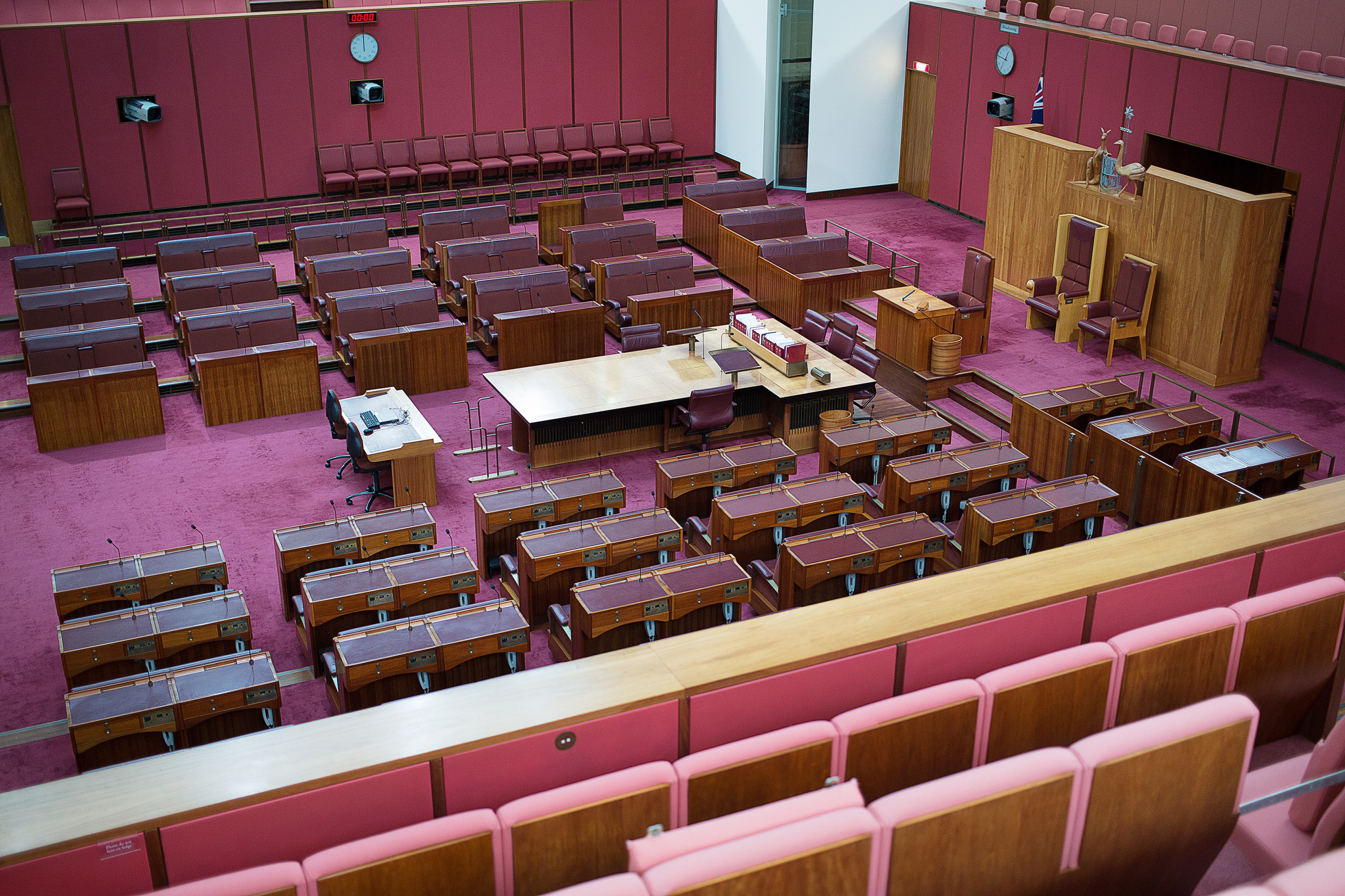The old Latin saying Senatores boni viri, senatus autem mala bestia well describes the Australian upper house:
Senators are good people; however, the Senate itself is an untamed beast
It takes high political acumen to navigate and lead an effective Senate. With the government holding only 36 of 76 seats, this thankless task has fallen to Senator the Hon Simon Birmingham. He has succeeded former Senator the Hon Mathias Cormann, whose resignation twelve months ago has facilitated a successful bid to become the 6th Secretary-General of the Organisation for Economic Co-operation and Development.
To mark a year since Senator the Hon Mathias Cormann retirement announcement and the rise of his successor, Senator the Hon Birmingham, the team at Nexus have compiled a comparative analysis into the leadership styles of the current and former Senate leader, their dynamic with the opposition, and their rapport with the crossbench to gain a fuller picture of Morrison’s upper house.
THE SENATORS

Hon Simon Birmingham – Leader of the Government in the Senate – Senator for South Australia
The experienced Senator began his political career in 2007 when he was chosen to represent South Australia, following the sad death of former Senator Jeannie Ferris.
He currently holds three prestigious positions: Minister of Finance, Vice-President of the Executive Council, and Leader of the Government in the Senate.
Born on the 14th of June 1974, Senator Birmingham would go on to graduate from the University of Adelaide, gaining a Master of Business Administration.
The Senator worked in politics long before his public debut. From 1995 to 1997, he worked as an Electorate Officer to Senator the Hon Robert Hill. Following this, he served as an adviser and then Chief of Staff to the State Minister for Tourism, Employment, and Youth, Mrs Joan Hall from 1997 to 2002.
The Hon Simon Birmingham also had a successful private sector career as the director of the Winemakers’ Federation of Australia from 2002 until 2007.
During his extensive career in parliament Senator Birmingham held the officers of Parliamentary Secretary to the Minister for environment from 2013-2014 and Assistant Minister for Education and Training from 2014-2015 under Prime Minister Abbott, before being promoted to Minister for Education and Training from 2015-2018 under Prime Minister Turnbull. Under Prime Minister Morrison, Senator Birmingham was appointed Minister for Trade, Tourism and Investment.

Hon Mathias Cormann – Former Leader of the Government in the Senate – Senator for Western Australia
Senator Cormann’s rise to become Senate Leader is Hollywood ready, complete with love, ambition, and a rise from obscurity to the highest house in the land.
Born in 1970 at Eupen, Belgium, the former Senate leader initially came to Australia to meet the family of his then partner (he ended up falling in love with the country instead). He moved to Australia permanently in 1996, joining the Liberal Party in the same year.
From 1997 to 2000, Senator Cormann was Chief of Staff to the then Minister for Family and Children’s Services, Western Australia. He then worked as a Ministerial Chief of Staff to Western Australian State Government Ministers, Senior Adviser to the then Western Australian Premier, Richard Court (2000 to 2001), and as an Adviser to the then Justice and Customs Minister, the Hon Chris Ellison MP (2001 to 2003). Between 2003 and 2007, Senator Cormann worked for the major Western Australian Health Insurer HBF in roles such as General Manager of HBF Health Insurance.
After being elected as a Western Australian Senator in 2007, Senator Cormann became the Shadow Parliamentary Secretary for Health Administration from 2008 to 2009, the Shadow Minister for Employment Participation, Apprenticeships and Training from 2009 to 2010, the Shadow Assistant Treasurer and the Shadow Minister for Financial Services and Superannuation from 2010 to 2013. In October 2019, Senator the Hon Cormann became the longest-serving Finance Minister, having surpassed the record previously held by the Hon Nick Minchin.
Senator Cormann announced in July 2020 alongside Prime Minister Morrison, that he would retire from Australia politics at the end of 2020. The final 6 months of the Ministers Senator career was focused on the Government July 2020 COVID-19 economic update, the October 2020 Federal Budget, and the December 2020 MYEFO Statement.
THE SENATE
CROSSBENCH
The success of any government in passing legislation rests on a supportive and reliable crossbench.
Many were initially sceptical of the Hon Mathias Cormann’s replacement, with crossbencher and Centre Alliance Senator Rex Patrick noting in July last year that he couldn’t “think of anyone in the Senate that immediately springs to mind of being able to fill all those things that Mathias did,”.
Twelve months later, hindsight has revealed Senator the Hon Simon Birmingham to be a fast learner. After successfully managing senate business out of the latter half of 2020, Senator Birmingham has passed significant portions of government business with the help of a mostly supportive crossbench.
OPPOSITION
In his three years as senate leader, the Hon Mathias Cormann found a strong political rival in the Senator the Hon Penny Wong.
The pair famously clashed on almost if not every matter of government policy; from their discussion of the ‘sports rorts scandal’ to a heated debate on government advertising, both Senators played their roles as strong advocates and proclaimed friends.
Regardless – and despite posturing from both sides – the Senator the Hon Cormann managed to work with his formidable counterpart to pass supply and the vital measures which enabled the JobSeeker and JobKeeper programs. The former Senate Leader’s lasting legacy may therefore be his pragmatic ability to work across political divides.
Even before his promotion, the Senator the Hon Birmingham and the Senator the Hon Wong did not always get along. Despite this, the united front against COVID has for the time being seen broad, bipartisan support for the pressing matters of national biosecurity. While campaigning has risen this year, the Senate Leader has maintained the public’s confidence in his ability to lead and manage the tough court of the Senate.
Although showing promise, it remains to be seen if, under normal circumstances, Senator the Hon Birmingham can maintain his image while managing a rigorous and well-practised opposition.
ANALYSIS
THE IMPORTANCE OF SOUTH AUSTRALIA
South Australia is not often considered as a nexus for political campaigns. Both Government and Oppositions Senate Leaders now hail from the state; this has elevated the political importance of a jurisdiction better known for excellent wine than its political leaders.
This unique relationship within the southern state has already played out in parliament. When in June, the Liberal and Labor Parties stood against a push by the Nationals to amendment the Water Act (2007) and Basin Plan Act (2012). Some perceived the amendments to disadvantage the supply and quality of the Murray-Darling Basin allocated to South Australia.
With home-state considerations, analysts will watch closely to see if a Southern Australian-led Senate will finally deliver a plan to end the long, arduous issues surrounding the Murray-Darling River.
WHERE IS CORMAN NOW?
After resigning from the Senate, The Hon Mathias Cormann was elected the 6th Secretary-General of the Organisation for Economic Co-operation and Development (OECD).
The OECD was founded in 1961 to facilitate global trade and today boasts 38 member countries. While its decisions are not legally binding, the organisation is considered to set economic and financial agendas and wields considerable clout.
Beginning his five-year term on the 1st of June 2021, he has identified the following as his top priorities:
- Economic recovery from the pandemic;
- Effective climate action and global net-zero emissions by 2050;
- Work to “finalise a multilateral approach to digital taxation”;
- Better manage the risks and opportunities of the digital age;
- Promote “market-based policies and a rules-based international order”; and to
- Facilitate more extensive OECD activity in Asia and the Pacific.
…IN CASE YOU MISSED IT
This week Labor dumped two signature policies they took to the 2019 election.
- Negativing gearing – which the opposition has argued would answer Australia’s housing crisis.
- Stage 3 Tax bracket changes – which was labelled ‘obscene’
It is understood that the changes were a ‘unanimous’ decision at Monday’s caucus meeting; however, these policy changes have been a sore point for the Labor leadership ranks over the last few months.
Latest posts by Nexus APAC (see all)
- United Kingdom General Election 2024: An Overview - April 15, 2024
- Australian Voters Go to the Polls - February 26, 2024
- Secretaries of Federal Departments – An Overview - February 1, 2024



